

Learner agency / Teaching. What is learner agency?
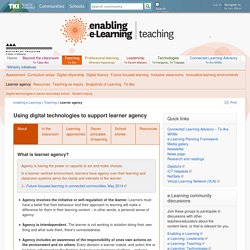
Agency is having the power or capacity to act and make choices.In a learner-centred environment, learners have agency over their learning and classroom systems serve the needs and interests of the learner.Future-focused learning in connected communities, May 2014 Agency involves the initiative or self-regulation of the learner. Learners must have a belief that their behaviour and their approach to learning will make a difference for them in their learning context – in other words, a personal sense of agency.
Agency is interdependent. The learner is not working in isolation doing their own thing and what suits them, there's connectedness. Derek Wenmoth. Learner Agency: The Missing Link. A collaborative blog series by Personalize Learning, LLC and the Institute for Personalized Learning.
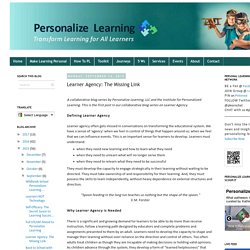
This is the first post in our collaborative blog series on Learner Agency. Defining Learner Agency Learner agency often gets missed in conversations on transforming the educational system. Learner Voice Demonstrates Commitment to Building Agency. Learner voice gives learners a chance to share their opinions about something they believe in.
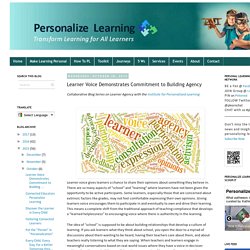
There are so many aspects of "school" and "learning" where learners have not been given the opportunity to be active participants. Some learners, especially those that are concerned about extrinsic factors like grades, may not feel comfortable expressing their own opinions. Giving learners voice encourages them to participate in and eventually to own and drive their learning. This means a complete shift from the traditional approach of teaching compliance that develops a “learned helplessness” to encouraging voice where there is authenticity in the learning. Strategies for Helping Students Motivate Themselves. My previous post reviewed research on extrinsic and intrinsic motivation, and described the four qualities that have been identified as critical to helping students motivate themselves: autonomy, competence, relatedness, and relevance.
In this post, I’ll discuss practical classroom strategies to reinforce each of these four qualities. Autonomy Providing students with freedom of choice is one strategy for promoting learner autonomy. Educators commonly view this idea of choice through the lens of organizational and procedural choice. Organizational choice, for example, might mean students having a voice in seating assignments or members of their small learning groups.
Some researchers, however, believe that a third option, cognitive choice, is a more effective way to promote longer-lasting student autonomy. Competence Feedback, done well, is ranked by education researcher John Hattie as number 10 out of 150 influences on student achievement. Relatedness 1. 2. 3. 4. Trend 1: Learner Agency. Explanation The concept of agency has been central to educational thinking and practice for centuries.
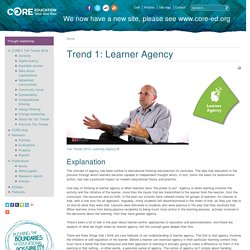
The idea that education is the process through which learners become capable of independent thought which, in turn, forms the basis for autonomous action, has had a profound impact on modern educational theory and practice. NIST example. Leadership, well-being and trust in the PYP - International Baccalaureate® 14 January 2020 Join Rynette de Villiers, Head of School at the International School of Utrecht in the Netherlands where she discusses leading an IB continuum school and developing a culture of well-being and trust - with a focus on teacher agency.
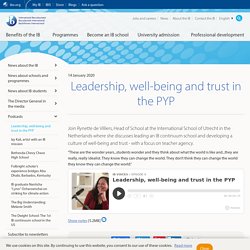
"These are the wonder years...students wonder and they think about what the world is like and...they are really, really idealist. They know they can change the world. They don’t think they can change the world they know they can change the world. " Show notes [5.2MB] Save Email. Copy of Student Agency Resources. Living with Agency. I believe we are living exciting times with regards to education.
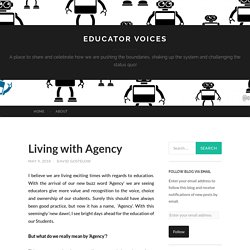
With the arrival of our new buzz word ‘Agency’ we are seeing educators give more value and recognition to the voice, choice and ownership of our students. Surely this should have always been good practice, but now it has a name, ‘Agency’. With this seemingly ‘new dawn’, I see bright days ahead for the education of our Students. But what do we really mean by ‘Agency’? This was a question I was puzzling over as I drove home from work this evening. I have posted some of my thoughts below. Learner Agency Workshop Replay. Choices for Children: Why and How to Let Students Decide (*) September 1993 Why and How to Let Students Decide By Alfie Kohn The essence of the demand for freedom is the need of conditions which will enable an individual to make his own special contribution to a group interest, and to partake of its activities in such ways that social guidance shall be a matter of his own mental attitude, and not a mere authoritative dictation of his acts.
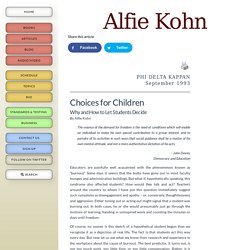
Defining Learner Agency. There is a significant and growing demand for learners to be able to do more than receiving instruction, follow a learning path designed by educators and complete problems and assignments presented to them by an adult.
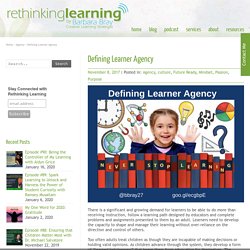
Learners need to develop the capacity to shape and manage their learning without over-reliance on the direction and control of others. Too often adults treat children as though they are incapable of making decisions or holding valid opinions. As children advance through the system, they develop a form of “learned helplessness” that keeps them from advocating for themselves. The process for learning and the role learners play must be different than most adults experienced. Student Agency: Creating An Integrated and Authentic K-12 Approach. It’s Time for Student Agency to Take Center Stage. By Marie Bjerede and Michael Gielniak, Ph.D Tony Wagner’s The Global Achievement Gap defines the modern workplace as an environment that no longer calls for compliant workers who wait to be told what to do, who believe that collaborating is cheating or who hoard information believing it to be power.
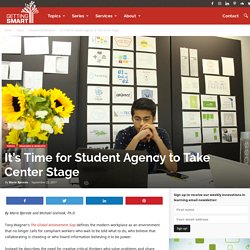
Instead he describes the need for creative critical thinkers who solve problems and share information with others. These sentiments are not new but seem to have become imperative to the future of our country. If our future is dependent on effective, self-directed employees, then we need to develop a high level of agency in students before they are assimilated into the workforce. The Intersection of Critical Thinking and Student Agency.
By Jenny Pieratt The desire to foster critical thinking in our students is nothing new to the field of education; in fact the ambition to teach humans to think deeply dates back to early thinkers such as Aristotle, who once said: “It is the mark of an educated mind to be able to entertain a thought without accepting it.”
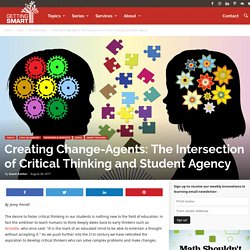
As we push further into the 21st century we have rekindled the aspiration to develop critical thinkers who can solve complex problems and make changes. Longitudinal studies have confirmed our fears that critical thinking as an “intellectual and practical skill seems to be a skill that the majority of students coming into higher education and the workforce are not only lacking in function, but also in understanding what the concept is.” What is Agentic Learning and Why is it Important? By Marie Bjerede and Michael Gielniak, PhD The word agentic is described as an individual’s power to control his or her own goals actions and destiny.
It stems from the word agency, which Webster’s Dictionary defines as the capacity, condition, or state of acting or of exerting power. In the late 1980s, Stanford University Psychologist Albert Bandura began developing a theory of social cognition that he associated with self-efficacy. He later examined more specifically the role of agency and motivation, and coined the term Agentic, in which people are viewed as self-organizing, proactive, self-reflecting and self-regulated, which he calls Agentic. The Willpower Gap - Misinterpreting Student Agency. There is something about how people learn that involves a balance of activeness vs passiveness, self-direction vs micro-management, ownership vs compliance, intrinsic vs extrinsic motivation. FINAL TEXT Preparing for the enhanced PYP. Don’t Say “Agency” Unless You Really Mean It – sonya terborg. The IBO recently shared a graphic as part of it’s work in revamping the Primary Years Programme. To be clear: This is their communications graphic illustrating the new organizing structure; not the new programme model.
Agency (Voice, Choice, and Ownership) feature heavily. Final Mercer. 2015 klemencic what is student agency submission version. The Art and Science of Developing Student Agency - New Teacher Center : New Teacher Center. By Kathleen Cushman, co-author, Belonging and Becoming (Harvard Education Press), and Wendy Baron, Chief Officer, Social and Emotional Learning, New Teacher Center Dreaming up a capstone project for his science class, Ryan Gallagher wanted something that would put his San Diego eighth-graders in the driver’s seat, as learners. “There’s this game,” he said with a wry smile, “and middle school kids can see it.” Convinced that their teachers know the right answers, the students play along. ‘Student Agency’ Is Not Something You Give or Take. I feel strange saying that I, a Davidson College Junior named Andrew, have obtained ‘Student Agency.’
Does that make me a ‘Student Agent,’ a sort of James Bond of the educational Free Will? Student Agency Part 1-#EduTechAU What the twitter feeds are telling me: The Student! Nina Davis: Teaching & Learning in Australia. Part 1: Student Agency? Teacher Agency? School Agency? Customization-Motivation-Equalization: School Culture. Developing student agency improves equity and access. Proudly telling the world about #generationIB in our 50th anniversary year. Search Results for “Agency” The Year of Agency. This past year, iPads, Chromebooks, and laptops continued to flood classrooms.